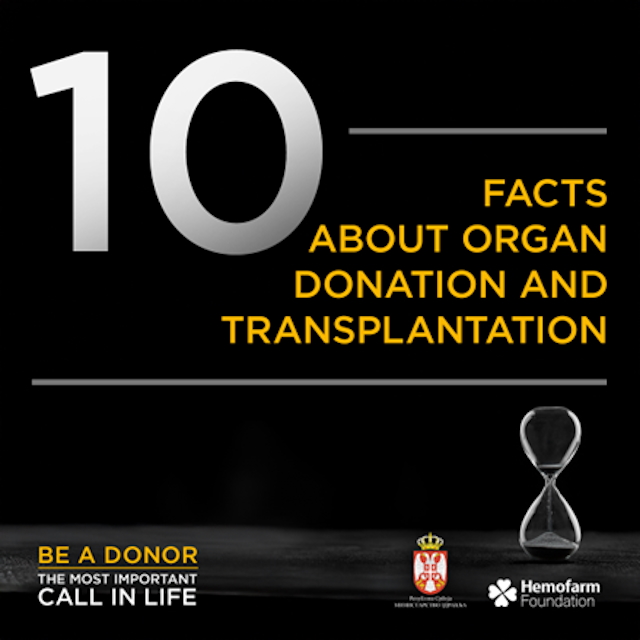10 facts about organ donation and transplantation

In order to promote better understanding and acceptance of organ donation, we present the public with 10 facts about organ donation and transplantation.
1. Anyone can be an organ donor if they have not signed a statement opposing organ and tissue donation. A person who wishes to be an organ donor should inform verbally their family about their wish. Organ donors can be living and cadaveric donors. Living donors are typically close relatives who can donate a kidney, part of the liver, one of two kidneys, one of two lungs, blood, bone marrow, or bone. Living donors may also donate organs to individuals who are medically determined to have a suitable match. Cadaveric donors are those who have been declared brain dead. The family of the deceased donor gives consent for organ donation, even if the deceased person declared themselves as a donor during their lifetime.
2. The persons who do not wish to be organ donors should inform their family members and their chosen doctor of their decision. Individuals who do not wish to donate must sign a statement opposing organ donation, which can be submitted to their primary physician or an authorized person at the Biomedicine Directorate (Pasterova 1, Belgrade).
3. The final decision on organ donation from a deceased person is made by their family. This is why it is important for anyone who wants to be an organ donor to inform their family of their decision, so that the family respects their will and takes it into account when making the final decision on whether to give consent for the deceased's organs to be donated and thus save lives of people on the waiting lists for transplantation or oppose the deceased's decision to be an organ donor. The decision of the family is final and is confirmed by a written statement. Only organs for which the donor or their family members have given consent can be donated. If the deceased has no family members, the procedure for realizing a potential donor of human organs is suspended.
4. Organ donation is anonymous, voluntary, and free of charge. The recipient and/or their family do not know who the donor is. The law prohibits the organ recipient from providing personal information about the donor or their family. Also, it is forbidden to give the recipient's personal data to the family of the deceased donor.
5. Saving lives is the priority of every doctor. Only patients who have undergone all possible medical procedures and treatments aimed at saving their lives, and for whom these measures do not result in improvement, may be considered potential organ donors.
6. People cannot wake up from brain death. Brain death is not a coma. Brain death is the permanent and irreversible loss of brain function, caused by the cessation of blood circulation to the brain. A team of doctors determines it through strictly defined medical procedures and diagnostic tests that confirm the absence of blood flow to the brain and irreversible damage to brain cells. These procedures are defined by medical standards and regulated by legal regulations. Brain death is considered the death of a person.
7. The process of explantation of donated organs is carried out through surgery. During the procedure, the deceased's body is treated with care and dignity. Consent for organ donation does not delay the deceased’s funeral.
8. Financial status and social position are not criteria for determining priority for transplantation. In order for a transplant to be carried out, there must be a match between various factors of the donor’s and recipient’s immune systems, as only in such cases can the transplant be successful and lead to the recipient’s recovery. In addition to immune compatibility, factors such as the recipient’s illness severity, time on the waiting list, additional health conditions, as well as the degree of vulnerability and urgency of the recipient themselves are also considered. The objectivity of the process is additionally ensured by the fact that the procedure for determining and confirming brain death, explantation and transplantation is carried out by separate medical teams, sometimes numbering up to 100 people.
9. Organ transplantation is the only therapeutic option when certain organs lose function permanently. As a treatment method, transplantation is the only chance for recovery for patients in need of it.
10. Before joining the Eurotransplant (ET) community, the Republic of Serbia must meet the necessary preconditions in the field of organ donation and transplantation, primarily increasing the number of actual donors. Member countries of ET must meet transparent and objective criteria. By joining Eurotransplant, the high mortality rates on waiting lists, the waiting time for transplants, particularly for kidney transplants would be reduced. From the moment of joining Eurotransplant, potential organ recipients will belong to a universal waiting list, with priority given to life-threatening cases, where children are at the top of the list, and highly sensitized patients have better chances of receiving a transplant due to the larger pool of donors.